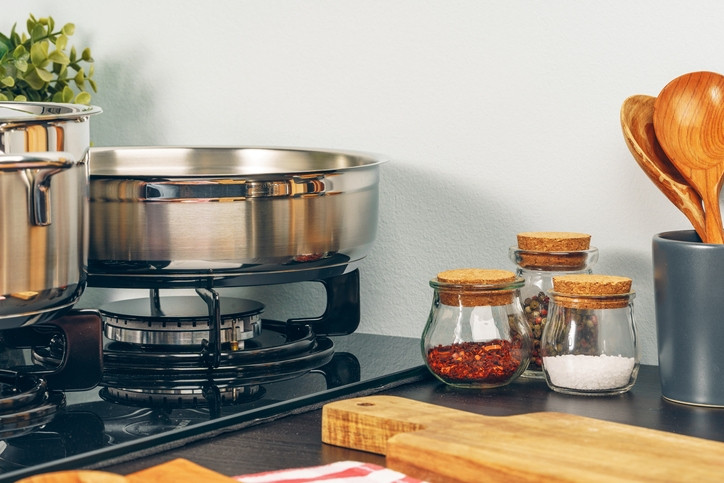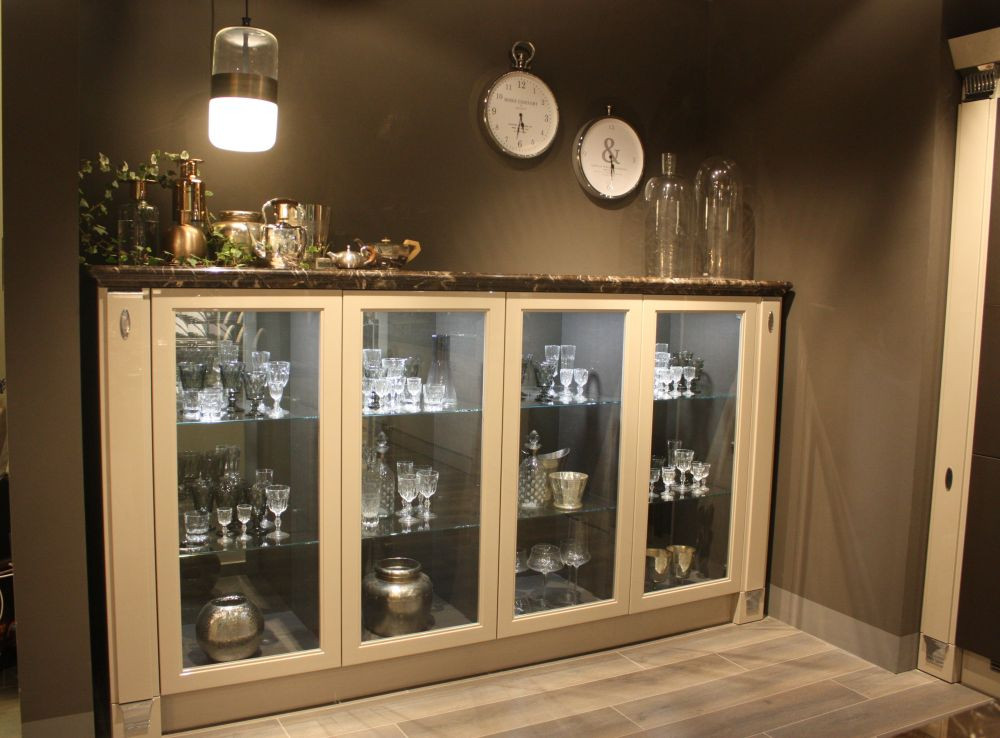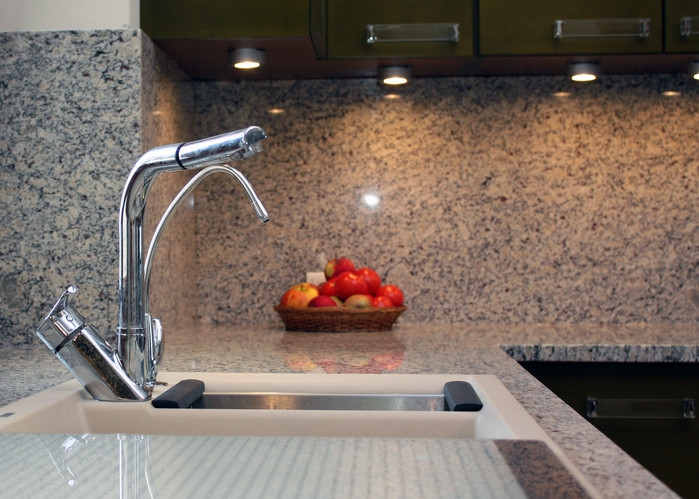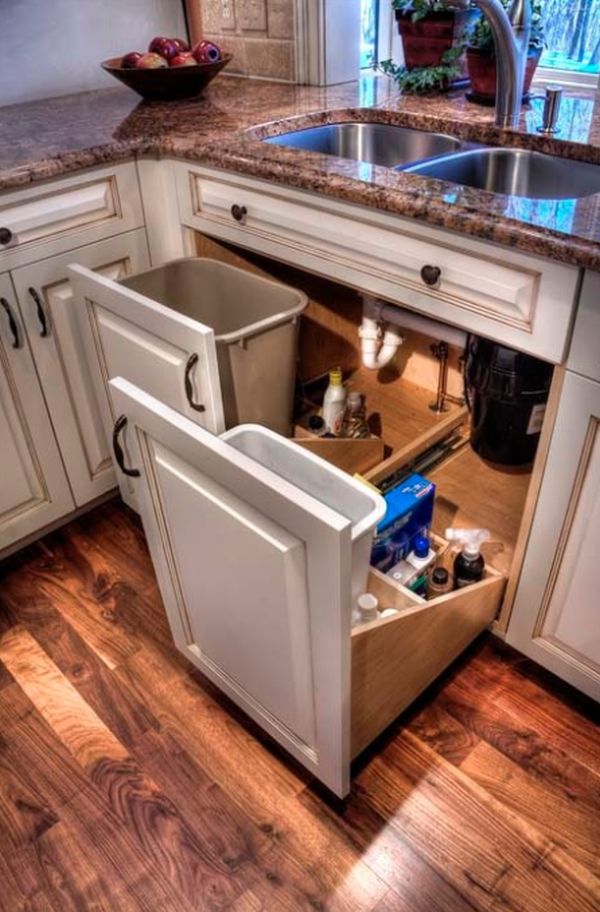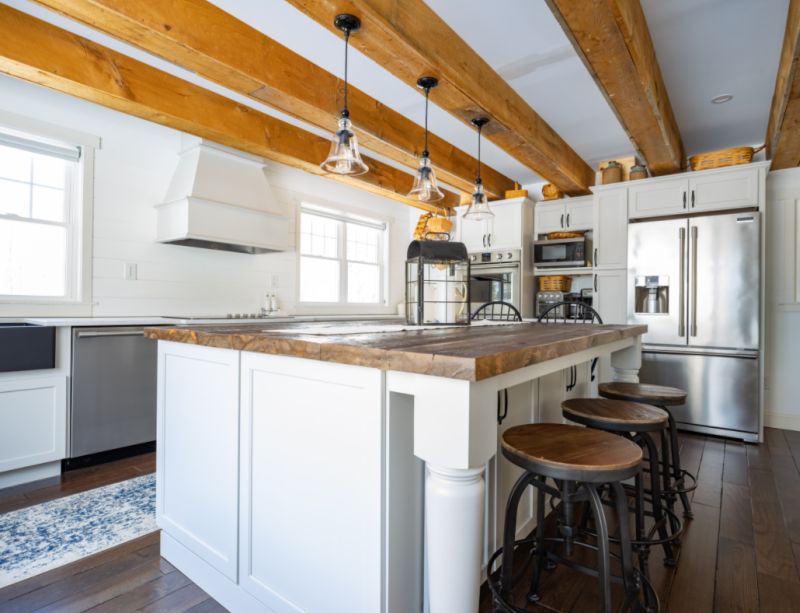
[ad_1]
The kitchen is the most popular room to remodel, according to the National Association of Homebuilders. So, chances are, if you remodel a room, it will be the kitchen. But you don’t have to go all out to make an impact.
One easy thing you can do to your kitchen is to add a backsplash. Adding a backsplash to your kitchen is one of the best things you can do for it. Not only does it look amazing, but it can up the value of your home substantially.
What Is A Backsplash?
 View in gallery
View in galleryBacksplashes are layers of material that are often put on the wall between the countertops and the above cabinets or ceiling. They are found in the bathroom and the kitchen but are most commonly added to kitchens.
You can install a backsplash yourself with tile or another material, or have a professional contractor do it for you. Either way, adding a backsplash can be the best thing you do for your kitchen and its resale value.
What Is A Shiplap Backsplash?
 View in gallery
View in galleryWhile most backsplashes are made from tile, you can make them out of anything that you want to make them out of. Shiplap is a great alternative to tile that looks just as good, and sometimes even better.
The average cost of shiplap is around $4 per square foot but ranges from $2 to $7 per square foot. On the other hand, tile has a much broader range but is generally is also around $4 per square foot.
This means, that the two have the same average but shiplap has a much smaller range. Because the cost of boards is fairly consistent while the cost of tile ranges from $1 to $20 per square foot. So the type of tile matters.
How To Use A Shiplap Kitchen Backsplash
 View in gallery
View in galleryThere are many different ways to use shiplap in your kitchen as a backsplash. But there are also a few key points to take note of when choosing your design. These designs are great ways to get inspired with shiplap backsplashes.
The Continuing Shiplap Backsplash
 View in gallery
View in galleryThe continuing backsplash is a common one and it makes a huge difference. You can use it on the walls and as a backsplash, making sure to have the two continue instead of cut each other off. You want a constant flow.
Pros
- Looks natural – doing your shiplap this way is a great idea. It looks amazing and as if it was meant to be built this way. It gives you plenty of room for large cabinets too because the shiplap will still be visible.
- Huge impact – this is a big one. Doing your shiplap like this will make a huge impact on the way that your kitchen looks. It will completely transform your kitchen even if you don’t do anything else to it.
- High-end – in short, your kitchen will look much higher-end if you do this to your kitchen. Adding the backsplash is one thing, but bringing that look to your walls as well will up the value of your home.
- Clean corners – when you can make sure the shiplap meets and overlaps instead of being cut off when the wall changes, you can make sure that the corners are clean. This will bring the entire kitchen together.
Cons
- Expensive – this is the biggest downfall to this look. You will no doubt pay significantly more for adding shiplap to your walls. The average backsplash square footage is 5-10sqft whereas a kitchen wall will be ten times that much.
- Hard to install – you need to use longer boards to make it look good and properly symmetrical. So it is harder to install a backsplash that is the same type of wall covering that is used on your kitchen wall.
White On White
 View in gallery
View in galleryWhite on white is a common way to do shiplap if you want to refrain from getting tagged with the “farmhouse” design style. Although shiplap is primarily for the farmhouse look, this is a way to make it look different.
Pros
- Looks clean – nothing looks cleaner than white. So adding white on white can look as clean as a kitchen can look. Getting white appliances and even white countertops can help complete the white on white look.
- Simplicity – there’s something special about a simple white design. It is simple, peaceful, and free of distraction. That’s why it is often used for those who have stressful lives due to outside circumstances or psychological reasons.
- Diverse design style – if you use white on white you can do anything you want with it, no matter your style. You can even add pops of color wherever you want, but the basic design should be white in this case.
Cons
- Can be stark – some people feel like white on white makes a room feel like a doctor’s office. As if it is boring and stark. However, others feel it is therapeutic. So this is all about personal taste.
- Hard to clean – we all know it is difficult to keep white clean. If you do keep it clean, it’s usually due to bleach, which can be harmful to use for extended periods in the kitchen. So cleaning it with bleach isn’t ideal.
Adding Diversity
 View in gallery
View in galleryIf white on white isn’t your thing, you can go the other way and use a simple shiplap backsplash and a lot of other details in your kitchen. The backsplash doesn’t have to define the kitchen, it can accent it.
Pros
- Customizable – if you go this route and add pictures, colorful cabinets, and contrasting floors, you can do it any way that you want. This is completely customizable and the sky is the beginning of the limit.
- Shows your personality – kind of along the same lines as the way you can customize a kitchen with a shiplap backsplash, you can also let your personality shine. Add little pieces of yourself in your kitchen.
- Adds character – you know what adds personality? Character. So if you go with this way of using a shiplap backsplash, you can be sure that your kitchen will have a lot of character. And the amount is up to you.
Cons
- Backsplash can disappear – if you go overboard with too many other things that draw your eye, the nice shiplap backsplash can disappear. Since this was the focal point before, it can be a shame when no one notices it.
- Can be too busy – if you add too much to your kitchen, it can be busy. No one knows where to look, no one knows what to appreciate. It is simply overwhelming to most people. So picking and choosing what to add is a good plan.
Going Vertical
 View in gallery
View in gallery
Most people will never think about putting their shiplap vertical. But you can do it! It makes the kitchen look taller and completely transforms the purpose of the shiplap backsplash. Doesn’t it look unique?
Pros
- Eclectic – of course, because it is different, this type of backsplash looks eclectic. But the term eclectic refers to something that is sort of hodge-podge and draws from various sources of designs.
- Unique – again, there’s not much more unique than trying something new. While most people will think a horizontal shiplap looks better, you can be the person to step out onto the water and put it vertically.
- Good flow – believe it or not, vertical shiplap can have better flow than horizontal shiplap. It draws the eye up and can open up a room. It makes the area look taller and if you have nice ceilings, this is a plus.
Cons
- Can make the kitchen look shorter – when a room looks taller, it usually also looks shorter. That’s one thing that a vertical shiplap backsplash can do. Especially if you add the wall into the design.
- Hard for some backsplashes – it can be difficult to install a vertical board backsplash if the area is short and wide. Because you will have to cut each board to be tiny and it will end up looking square.
Incorporating The Ceiling
 View in gallery
View in galleryIncorporating the ceiling into your backsplash design can be even more impactful than incorporating the walls. Ceilings are often neglected and forgotten. But if you use shiplap on them, then you can change this.
Pros
- Draws eye to the ceiling – if there’s one way to draw your eye to the ceiling, it’s to add something unique or funky. Shiplap is a good way to do that. Start at the backsplash and keep going up until the entire space is covered.
- Uses ceiling space – it can be hard to use your ceiling space. Most people cover it, paint it white, and forget about it. But instead of trying to make it disappear, you can bring it to life with shiplap.
- Looks very high-end – this is one of the best ways to make your ceiling look high-end. It can be hard to make a ceiling look expensive, but there’s one thing we can all agree on. Good shiplap always looks high-end.
Cons
- Can close room in – although if done right, a shiplap ceiling can make a room look bigger, it can also make it feel cramped. So it’s important that you think it through and decide the best route for you.
- Hard to install – it is not easy to install anything on your ceiling. But it is especially hard to install shiplap because it has to be done board by board if it is a proper shiplap. This is exhausting and often dangerous.
How To Install A Shiplap Backsplash
 View in gallery
View in galleryInstalling shiplap isn’t as difficult as it seems. All you need are a few tools, the shiplap, and paint if you plan on painting your shiplap. Here are the steps you can take to install a shiplap on your own without a contractor.
Step 1: Prepare Your Wall
You can either use shiplap as a wall covering or you can install it over an existing wall covering, like drywall. If you have an existing wall, make sure it is clean and that all of the trim and moulding are removed.
If your wall isn’t white, you will need to paint it as shiplap will have a gap that will allow the color to pass through. So paint it the same color as your shiplap will be to avoid bright colors showing through.
Related: Kitchen Backsplashes Dazzle With Their Herringbone Designs
Step 2: Measure The Space
The best way to find out how much shiplap you need is to measure the space after you remove any trim. Find the square footage of the area and then add about 10% to make sure that you don’t need any extra.
Step 3: Find And Mark Studs
While most studs are 16-inches apart, you can’t rely on this measurement completely. Instead, either invest in a stud finder or look for visual studs. If this is your wall covering, you will already know where the studs are.
 View in gallery
View in galleryStep 4: Level The First Board
It’s very important that the first board you place is level. Use a good level and make sure it is level before you move on to the next one. Do this with the first few boards. The only one you can’t do it with is the top one.
Step 5: Secure The Boards
The easiest way to begin securing the boards is to glue the first one down. But if you have a partner, this isn’t necessary. They can hold the board up while you screw it into the stud. From there, it’s easy as you can use the lower board to hold it up.
If you are alone, you can use spaces to give that authentic look. because shiplap shouldn’t be sandwiched together. It should be slightly spaced instead. Use coins or spacers to do this.
Also, make sure that you stagger the boards. Cut one board in half and use it for the second row. Make a staggering pattern, being careful not to stairstep.
Making It Your Own
 View in gallery
View in galleryAfter you’ve installed your shiplap, all that’s left to do now is make it your own. So add your own personal touches to bring the entire room together. Choose shiplap backsplash styles that suit you and create a masterpiece.
[ad_2]
Source link



